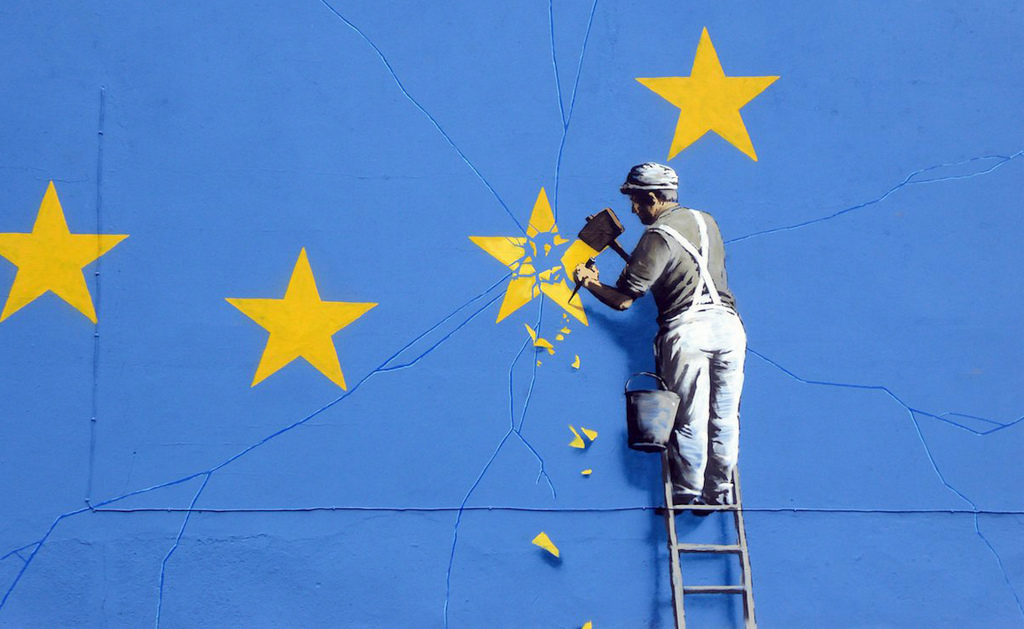Battle Royaume
The Brexit Withdrawal Agreement is here – or is it?

Source: Duncan Hull | Flickr
During his 2015 UK general election campaign, the former UK Prime Minister David Cameron repeatedly stated that the voters were facing a choice between his party or chaos. But looking back now, it surely looks like the nation of shopkeepers got themselves a two-for-one deal.
This whole Brexit thing formally began as David Cameron’s miscalculated attempt to unite the Conservative Party and enters its final showdown as the current UK Prime Minister Theresa May’s weak attempt to unite the Conservative Party. The now over five-year-long team-building exercise (Cameron announced the referendum in January 2013) has rather obviously failed, as the barking dogs of British populist right have not settled for any of the bones on offer. Instead, the entitled egotists hurried stubbornly to the undeliverable “sunlit uplands” where a free trade deal offered by German car manufacturers and French wine moguls – “one of the easiest in human history” – would wait for them. Titanic success, they said, Titanic.
Nine cabinet ministers voiced their opposition to the Draft Agreement on the withdrawal of the United Kingdom of Great Britain and Northern Ireland from the European Union and the European Atomic Energy Community, as agreed at negotiators’ level on 14 November 2018 during a 5-hour marathon meeting on Wednesday (14 November) afternoon. Yet, I’m not sure they knew what they were opposing: it would have required them to read around 50 pages an hour without sleeping to make it through the 585-page document between its announcement and the cabinet meeting scheduled at 2 pm. But then again, Brexit isn’t fought on knowledge, understanding, or diligent research.
Case in point: Brexit Secretary Dominic Raab said last week that he “hadn’t quite understood” how important the Dover–Calais crossing is for Britain. One would think that the UK’s chief negotiator for the country’s single most important political event in generations would have had an idea. But apparently one would be wrong. According to the London-based Institute for Government, the Port of Dover actually handles around 17% of the UK’s entire annual trade in goods in value. That’s about £36.6 billion worth of goods going in and out of Dover each year. But the people have had enough of experts anyway, am I right Michael Gove?
Mr Raab resigned on Thursday morning. He published his resignation letter online explaining that he “cannot in good conscience support the terms proposed for our deal with the EU” – never mind that he was referring to the proposed terms of a deal he himself had negotiated and agreed as the representative of the UK’s negotiation positions in these talks. But the obvious point for Mr Raab here is to distance himself from the withdrawal deal as quickly as possible before it is torn apart in the Parliament and let Theresa May, who has no options but to stand behind the deal no matter what, bear the brunt of the damage. Resigning allows him to attempt to lead the free market Brexiteer opposition further political points. After all, blame-shifting has been somewhat of a staple of the Brexiteers even before the referendum.
Like rats from a sinking ship, Brexiteers have been abandoning HMS Titanic Success left and right since Theresa May’s statement that the cabinet had “collectively”, but not unanimously, approved the proposed withdrawal deal. Seven members of the government, including the Brexit Secretary, resigned to the backbenches on Thursday alone. On top of this, of course, the original Brexit Secretary David Davis and former Foreign Secretary Boris Johnson resigned from the cabinet already in July following the unveiling of Theresa May’s “Chequers” Brexit plan. The last thing they want is to be held accountable for something for which they are responsible. Many of them continue to insist that the cake is firmly on the table and that those who cannot see it are just not believing hard enough.
So where do we go from here? It’s impossible to predict, really. What we do know is that passing the deal is highly uncertain in the UK House of Commons, while EU member states will address their concerns to the Commission during a summit on 25 November. Out of the two, the tougher test for the deal will by far be the political volatility in London.
For instance, not wanting to feel left out from the carnival of public outrage, the Right Honourable Member for the 18th Century, Jacob Rees-Mogg, has already sent a letter demanding a vote of no-confidence on Theresa May. The hard Brexiteers would need 48 of these letters, after which it is not even clear whether they would have the required 159 Tory votes to oust Theresa May from Number 10. But were this to happen, challenger candidates for the leadership include the likes of Boris Johnson, Michael Gove, and even Dominic Raab. They have been very quick to boast how they would have done a better job on the withdrawal deal (on the Northern Ireland backstop in particular), but these assertions to renegotiate the deal and pass it before 29 March 2019 lack serious credibility. As always, Brexit has shown itself to be nothing more than internal British bickering. The utter pointlessness of it all.
Ultimately, even if the draft agreement is passed by the UK Parliament and accepted by the member states, it settles nothing in the long run. Then we are in for a transition period and lengthy future relationship negotiations for the years to come. We have only just reached the season 2 finale.
